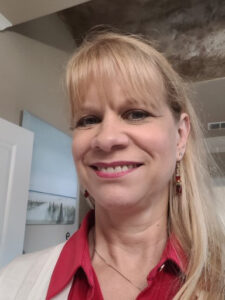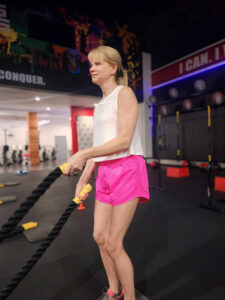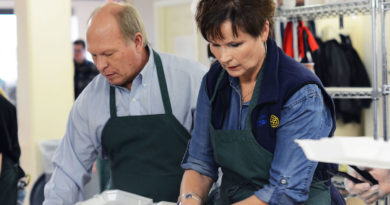Woman’s unexpected heart health warning: Listen to your body
By BOBBIE JO YOUNG | Photos by BOBBIE JO YOUNG and courtesy of LEZIE MANN
 On the night of June 21, Lezlie Mann experienced some unusual symptoms that had the vibrant and health-conscious woman concerned.
On the night of June 21, Lezlie Mann experienced some unusual symptoms that had the vibrant and health-conscious woman concerned.
“I felt a racing heart, slight pain just below my collarbone, and a tightness under my left shoulder blade that spread up to my shoulder,” she said.
These sensations were fleeting, lasting only about five minutes, and they recurred over the next two nights. Despite her concern, Lezlie’s symptoms didn’t match the typical profile of a heart attack as described on the internet or even by her doctors. She also didn’t fit the typical profile of a heart attack patient — she is physically fit, a healthy weight and by all accounts, perfectly healthy.
Lezlie’s vigilance paid off when, on June 24, she experienced the symptoms again while playing in the pool with her grandchildren. This time, the episode was exercise-induced, after swimming just 20 feet. It was then that she knew she had a problem and needed to take action.
“I was officially freaked out and called a friend to take me to the hospital,” she said.
Her friend insisted she call 911, a decision that possibly saved her life. Reflecting now, she realizes, “Logic goes out the window when you’re panicking.”
The emergency medical technicians and emergency room doctors were initially skeptical.
“The EMT was confident that I was not having a heart attack,” Lezlie said.
Her EKG results were normal, but due to her persistent mild chest pain and abnormal troponin levels — an enzyme indicating muscle damage — the ER doctor decided to admit her to Baylor Scott & White Health – Temple. An echocardiogram revealed an abnormality in one area of her heart, indicating reduced function. This led to a heart catheterization, which uncovered a 95% blockage in her largest artery, often referred to as a “widow maker.” A stent was placed, marking the beginning of Lezlie’s journey to recovery.
 Lezlie is incredibly grateful for the care she received. She deeply appreciates the Salado EMTs and the hospital staff, including doctors, nurses, technicians and phlebotomists.
Lezlie is incredibly grateful for the care she received. She deeply appreciates the Salado EMTs and the hospital staff, including doctors, nurses, technicians and phlebotomists.
“Every person I met at Baylor Scott & White was very professional, but more than that, they all were kind, caring, and gentle,” she said.
Her experience contrasts sharply with the common perception that women do not always receive the same treatment as men in the ER.
“If you only take away two things from my story, please take away these: my symptoms did not match the lists, and nobody thought I was having or had already had a heart attack.”
Lezlie‘s ordeal highlights the need for women to be their own health advocates. Her story is a powerful reminder that heart disease is a silent and often sneaky killer, one that takes the lives of more women than all cancers combined. And even if you take great care of yourself, you can still have a heart attack. She wants to raise awareness and emphasize the importance of listening to your body, no matter how insignificant the symptoms may seem.
“Listen to your own body. Nobody knows your body as well as you,” she said.
Heart disease doesn’t always present itself with the classic symptoms, and it’s crucial to take any unusual signs seriously. Lezlie’s story is a poignant reminder that heart disease can strike anyone, regardless of how healthy they appear to be. Her message is clear: don’t be afraid to overreact when it comes to your health. It’s better to be safe than sorry.




